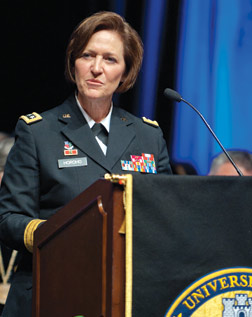Universities Prepare Leaders in Nation’s Academia, Industry, and Military
(This is the printed version of remarks delivered by Patricia D. Horoho (NURS ’92G) during the Feb. 24, 2012, University of Pittsburgh Honors Convocation in Carnegie Music Hall, Oakland. Horoho, who was honored as a 2012 Distinguished Alumni Fellow, is a U.S. Army lieutenant general and the U.S. Army surgeon general and commanding general.)
Chancellor Nordenberg, Provost Beeson, [Pitt Alumni Association President] Dr. [Jack] Smith, distinguished alumni and f aculty, honored students, my fellow honorees David Tepper and John Petersen, and, especially, family members who are here to support the University family, it is my privilege and pleasure to be here today and be honored as one of your distinguished alumni.
This year the University of Pittsburgh celebrates “225 Years of Building Better Lives” and providing outstanding undergraduate and graduate education. It is this nation’s universities that help keep us a world leader and help create tomorrow’s leaders in academia, private industry, or—should you value service to country as highly as I do—in our country’s military.
It has been my great opportunity to be of service to an outstanding organization—Army Medicine—that also claims a magnificent tradition and more than 236 years of service to country in support of those who wear the cloth of our nation. Since 1775, America’s medics have stood shoulder to shoulder with our fighting troops—ready when called to put their lives on the line to care for our wounded soldiers.
One such outstanding soldier is one of 2010’s Distinguished Alumni from the University of Pittsburgh—Jeremy Feldbusch. Sgt. (Ret.) Feldbusch (A&S ’01) is an Army Ranger, Purple Heart and Bronze Star recipient, and the first national spokesperson for the Wounded Warrior Project. I thank Sgt. Feldbusch for his service to country and his fellow soldiers. I have never been prouder as a military officer than to say that I can stand alongside the world’s finest medics and soldiers—soldiers such as Sgt. Feldbusch.
The Army, however, could not prepare soldiers such as Mr. Feldbusch without the education, research, training, and partnerships provided by institutions such as this one. It was my training at the University of Pittsburgh as a clinical trauma nurse specialist that helped to propel me along in my career. Without colleges and universities providing the education that they do, our nation would not be the greatest country in the world.
It is the partnerships that academia forms with private industry and government that allow us to develop ideas and products for success. This university partners with students and families, it partners with industry to research and develop better products that improve our lives, and this university partners with the U.S. government to help our men and women in uniform.
I particularly want to mention the partnerships that Army Medicine and our Institute of Surgical Research have with our nation’s research universities—the McGowan Institute for Regenerative Medicine of this university in particular—that help rebuild the lives of our soldiers and improve our capabilities to do facial reconstruction, burn treatment, healing without scarring, limb salvage, and limb reconstruction.
These commercial and academic partnerships—together with military and government organizations—are essential to the long-term success of efforts such as the Department of Defense’s regenerative medicine research. Without these partnerships, we cannot effectively solve the problems that our wounded warriors face and help rebuild their lives.
There is one other partnership I’d like to mention. Currently, there are more than 500 veterans attending the campuses of the University of Pittsburgh, and each year, between 10 and 30 active duty members of the military graduate from Pitt. Nearly 150 additional students are cadets with ROTC. No partnership is more critical to the success of our military and country than one that ensures that our veterans receive the finest education we can provide for them.
Finally, let me repeat how deeply honored I am to be here. By recognizing my distinguished fellow alumni and me with this award, you are helping to build bridges of success that benefit students, industry, and government equally.
Thank you, Mr. Nordenberg, for this prestigious recognition—and to all of the student honorees here today—congratulations!
Other Stories From This Issue
On the Freedom Road

Follow a group of Pitt students on the Returning to the Roots of Civil Rights bus tour, a nine-day, 2,300-mile journey crisscrossing five states.
Day 1: The Awakening
Day 2: Deep Impressions
Day 3: Music, Montgomery, and More
Day 4: Looking Back, Looking Forward
Day 5: Learning to Remember
Day 6: The Mountaintop
Day 7: Slavery and Beyond
Day 8: Lessons to Bring Home
Day 9: Final Lessons


